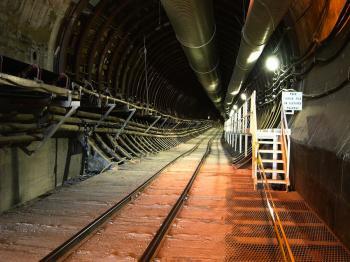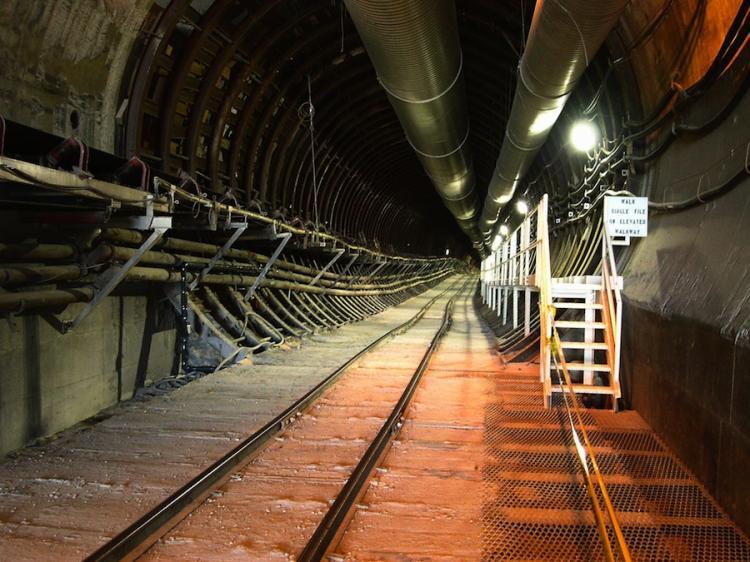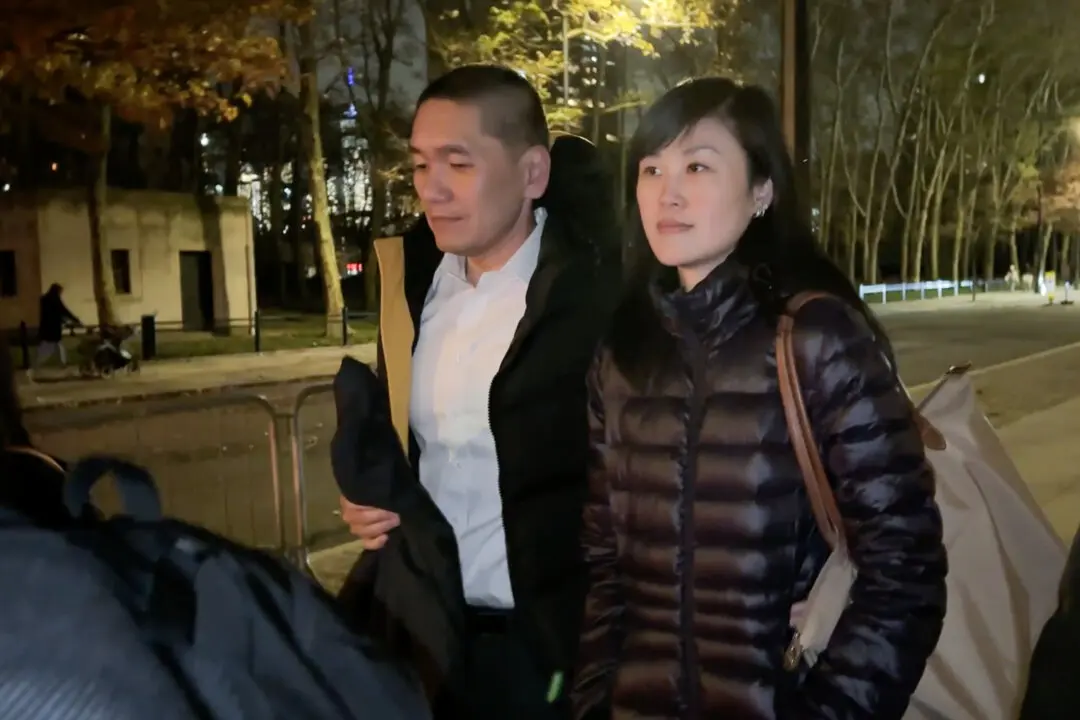Nuclear waste may be closer to finding a permanent home at Nevada’s Yucca Mountain. As of Tuesday, the multiyear licensing process for the Nevada nuclear waste disposal site will continue moving forward. The Atomic Safety and Licensing Board ruled against the Department of Energy ’s (DOE) request to withdraw the application for the Yucca Mountain nuclear waste repository. The decision goes against the efforts of Energy Secretary Steven Chu, Senate Majority Leader Harry Reid (D-Nev.), and President Obama to prevent the facility from moving forward.
Yucca Mountain is located inside the Nevada Test Site, a DOE nuclear testing ground about 90 miles northwest of Las Vegas. Some experts say that the volcanic rock Yucca Mountain is made of is perfect for holding the radioactive waste long enough for it to decay. If it is licensed and built, the facility will serve as a final resting place for all U.S. spent nuclear fuel and waste products.
At present nuclear waste is stored at more than 70 above-ground facilities across the United States. Some argue an underground facility would be safer, especially for storing radioactive waste that will continue to be radioactive for millions of years. The Yucca Mountain proposal would store packaged waste in tunnels 1,000 feet below the surface.
The site was first studied by DOE as a potential repository for nuclear waste in 1978. After Congress decided on the site, the Environmental Protection Agency (EPA) was tasked in 1992 with creating standards for the nuclear repository. In 2002 Bush approved the site for development and in 2008 the EPA standards were released.
The DOE then applied for a license for the facility from the U.S. Nuclear Regulatory Committee in June 2008. Licensing is a multiyear process.
But after the 2006 midterm elections, Nevada Sen. Harry Reid became senate majority leader.
Reid is opposed to locating the facility in his home state, and the Obama administration believes the science behind the Yucca Mountain facility is not sound. So the DOE filed a motion with the Nuclear Regulatory Commission to withdraw the licensing application. On Tuesday, the licensing board denied DOE’s motion.
“Today’s decision affirms what I have been saying all along,” said U.S. Rep. Doc Hastings (R-Wash.) in a statement released on his website Tuesday. “Yucca Mountain remains the legally designated national repository for spent nuclear fuel and high-level defense waste, and the Department of Energy has no authority to withdraw the license application. Only Congress can change the law.”
Hastings and fellow Washington state Rep. Democrat Jay Inslee are part of a group of congressmen sponsoring a resolution to stop the administration from cutting funding for the project. The congressmen see Yucca Mountain as important in ridding their state of spent nuclear fuel and defense waste.
But the DOE is not ready to give up. In a statement responding to the decision the DOE said it is confident, “we have the legal authority to withdraw the application for the Yucca Mountain repository. We believe the administrative board’s decision is wrong and anticipate that the Nuclear Regulatory Commission will reverse that decision.”
The American Nuclear Society and The National Resources Defense Council did not return requests for comment by press time.
Yucca Mountain is located inside the Nevada Test Site, a DOE nuclear testing ground about 90 miles northwest of Las Vegas. Some experts say that the volcanic rock Yucca Mountain is made of is perfect for holding the radioactive waste long enough for it to decay. If it is licensed and built, the facility will serve as a final resting place for all U.S. spent nuclear fuel and waste products.
At present nuclear waste is stored at more than 70 above-ground facilities across the United States. Some argue an underground facility would be safer, especially for storing radioactive waste that will continue to be radioactive for millions of years. The Yucca Mountain proposal would store packaged waste in tunnels 1,000 feet below the surface.
The site was first studied by DOE as a potential repository for nuclear waste in 1978. After Congress decided on the site, the Environmental Protection Agency (EPA) was tasked in 1992 with creating standards for the nuclear repository. In 2002 Bush approved the site for development and in 2008 the EPA standards were released.
The DOE then applied for a license for the facility from the U.S. Nuclear Regulatory Committee in June 2008. Licensing is a multiyear process.
But after the 2006 midterm elections, Nevada Sen. Harry Reid became senate majority leader.
Reid is opposed to locating the facility in his home state, and the Obama administration believes the science behind the Yucca Mountain facility is not sound. So the DOE filed a motion with the Nuclear Regulatory Commission to withdraw the licensing application. On Tuesday, the licensing board denied DOE’s motion.
“Today’s decision affirms what I have been saying all along,” said U.S. Rep. Doc Hastings (R-Wash.) in a statement released on his website Tuesday. “Yucca Mountain remains the legally designated national repository for spent nuclear fuel and high-level defense waste, and the Department of Energy has no authority to withdraw the license application. Only Congress can change the law.”
Hastings and fellow Washington state Rep. Democrat Jay Inslee are part of a group of congressmen sponsoring a resolution to stop the administration from cutting funding for the project. The congressmen see Yucca Mountain as important in ridding their state of spent nuclear fuel and defense waste.
But the DOE is not ready to give up. In a statement responding to the decision the DOE said it is confident, “we have the legal authority to withdraw the application for the Yucca Mountain repository. We believe the administrative board’s decision is wrong and anticipate that the Nuclear Regulatory Commission will reverse that decision.”
The American Nuclear Society and The National Resources Defense Council did not return requests for comment by press time.






